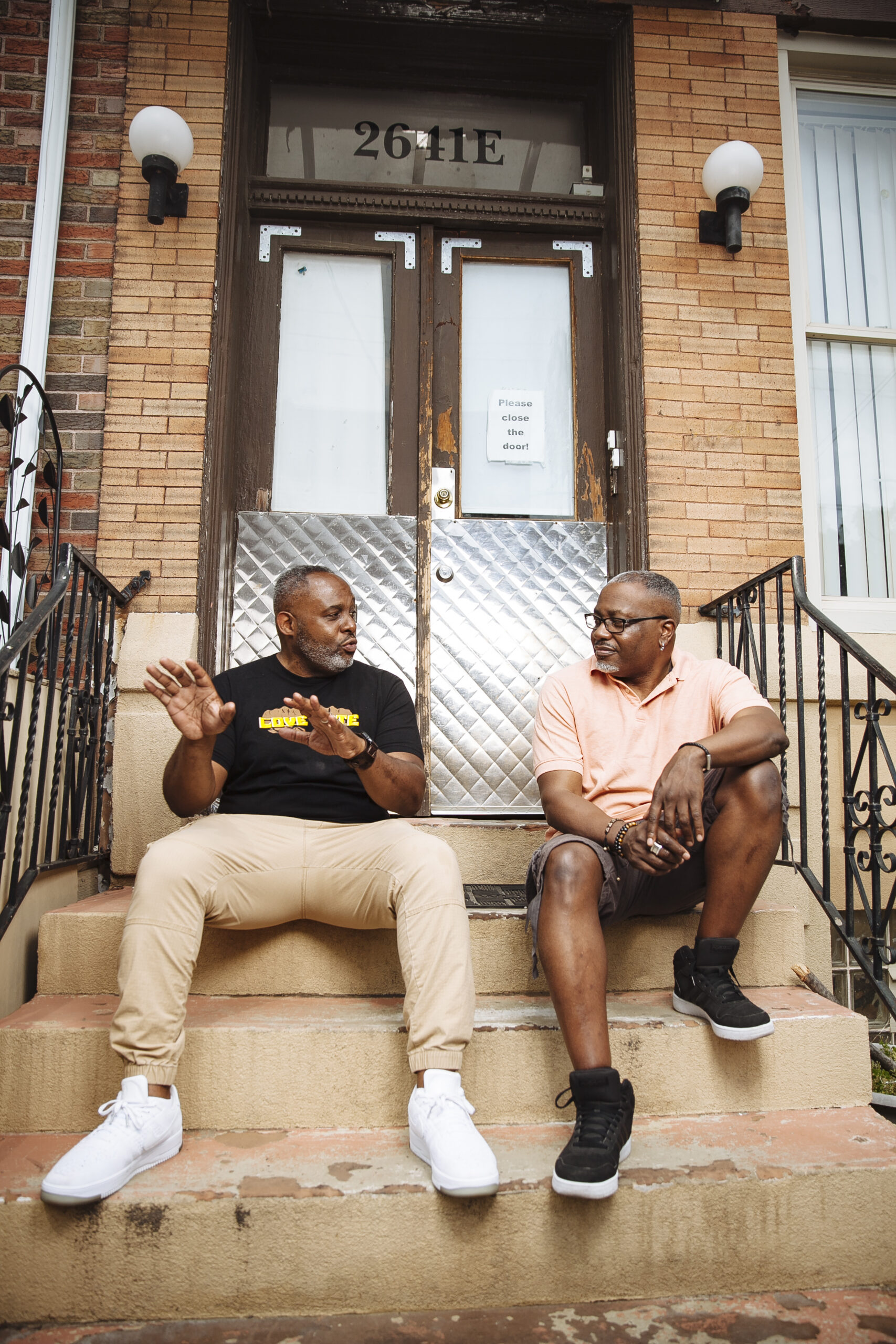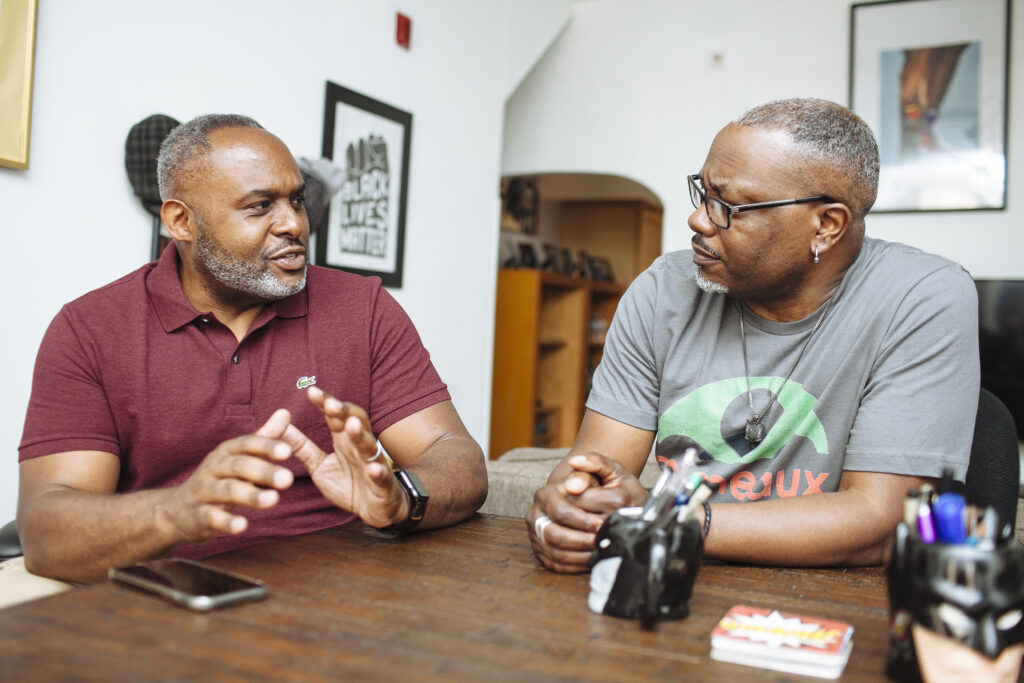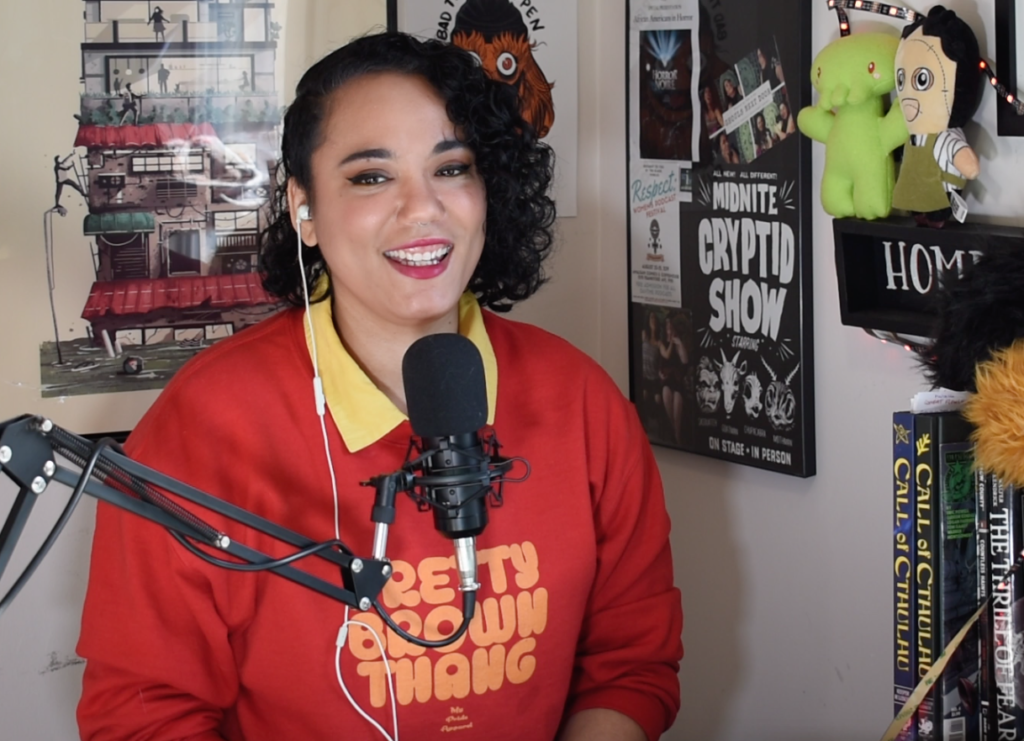
21 Feb Philadelphia Artist Spotlight: Len Webb and Vincent Williams of Micheaux Mission
BY GABE CASTRO
The cinéSPEAK Journal publishes a monthly Philadelphia Artist Spotlight highlighting local filmmakers and moving image artists doing unique and impactful work.
Micheaux Mission, a video podcast comprised of Len Webb and Vincent Williams, is on a mission: Two men. One podcast. Every Black film ever made. Named for the acclaimed African-American filmmaker, Oscar Micheaux, the two creatives have worked to dissect the magic of Black film. Len Webb is a freelance podcast producer and creator, known for his award-winning geek culture show, Black Tribbles (2011-2021). His podcast knowledge and love for all things nerdy elevates the program. His programming expertise influences special topic series to watch in addition to their regular programming, including a weekly talk-back show, Ripples in Time, about the Kindred series on FX.
Vincent Williams is a self-described lifelong “pop culture scholar.” Originally from Baltimore, Williams wrote critiques for the arts and culture scene. After his transition to Philadelphia, he began hosting It’s All Soul (2012-2015), a weekly showcase of 70s soul and 90s hip-hop for G-town Radio. He also has a PhD in English and his academic lens coupled with his fascination with the nerd world contributes to the education and humor of the program. The two of them together are a charming blend of passion and inside jokes, but more importantly, a knowledge and appreciation for the filmmaking world that transforms the show into something comfortable, as if you’re hanging out with friends, appreciating the films of our lives together.
Listeners may question, what makes a Black movie? In an interview with the Philadelphia Inquirer, Webb addresses the question and the ambiguity of their show’s requirements saying, “Well there is the obvious criteria: movies with a predominantly Black cast or the main antagonist or protagonists are Black.” It’s about more than speaking on Black films though; there is a determination to take up space in a very white podcasting world, understanding that often the Black experience and Black films are terribly underrepresented. In that same interview, Williams explains how he takes action through the podcast, stating, “You might get people talking about The Color Purple, Do the Right Thing, and Blazing Saddles, but they are all coming from the same perspective. Rather than complain about it, we, like Oscar Micheaux, decided to do it for ourselves.”
With over 300 episodes, available as podcasts and/or YouTube videos, the creators have seen their fair share of brilliant films and, of course, some grueling ones. But that’s the beauty of film, offering a range of experiences, stories, and moments that Micheaux Mission works to amplify. Recently the creators hosted a live discussion at City Winery with a screening of The Outside Story, surrounded by their vocal and passionate fans known as “Missionaries.” Webb and Williams certainly entertain. However, the community they’ve cultivated, online and, in these rare instances, in person, makes their program truly special. With 330+ opportunities to revisit our favorites, laugh about the failures, and celebrate Black stories on screen, Micheaux Mission offers a wonderful escape into the Black cinematic world. Whether the good, the bad, or the ugly: the show promises every Black film ever made.

cinéSPEAK asked Micheaux Mission about their program. We explore the themes that inspire their work and the impact they want to leave with their show.
cinéSPEAK: Each month or so, you cover films under specific themes and seek to address specific topics, decades, or genres. What inspired you to cover films under your upcoming Class of 1989 theme?
Micheaux Mission: Here’s a little-known fact: in the 1980s, there were only 63 Black films by, for, or about Black Americans (roughly). By the 1990s, that number quadrupled, with 220 Black films making their way to cinema screens nationwide. We ask, what sparked this “Black New Wave?” Who blazed this path for contemporaries like Ava DuVernay, Kasi Lemmons, and Jordan Peele? And how did these films transform American culture as a whole?
cinéSPEAK: How are you going to answer those questions on your show?
MM: We plan to take our listeners through the Black film renaissance of 1989–a year of contradiction, controversy, and ultimate triumph for Black cinema–and analyze the six films that left an indelible mark on the world: Harlem Nights, Lean on Me, Glory, A Dry White Season, Do the Right Thing, and Driving Miss Daisy.
Through conversations with experts like Palme d’Or-nominated actor-director Bill Duke (Deep Cover, A Rage in Harlem), cinematographer Michelle Crenshaw (Friday, Home Alone), BlackStar Film Festival founder Maori Holmes, and veteran NPR contributor Tim Cogshell, we are exploring the year’s enduring films and explaining how 1989 flipped the script.
cinéSPEAK: How has Philadelphia shaped and influenced the process and/or content of your work? And what impact do you hope your work will have in the Philadelphia community?
MM: Though Vincent hails from Baltimore and Len is Philly-bred, we both eat, sleep and breathe Philadelphia and praise the city’s attributes in all our works.
We hope to impact Philadelphia through live film screenings. We look to bring our discourse to the public, increasing awareness of slighted works of art and its commentary on the Black experience.
You can watch the Micheaux Mission every Tuesday at 6 PM EST on Youtube or Facebook. Be sure to join the community of “Missionaries” on Facebook to engage in fun and thoughtful conversations about the Black cinematic landscape.
*Featured Image: Vincent and Len on the stoop. Image Credit: Zamani Feelings.
Would you like to be featured in a future spotlight? Please fill out the Philadelphia Artist Spotlight form. The cinéSPEAK Journal maintains sole discretion over the publishing of any information provided via the form. Questions: journal@cinespeak.org

Gabe Castro is a Philadelphia-based Latiné multimedia professional specializing in the horror genre. Gabe believes media can be used as a tool to bring social change and works in all she does to create impactful and inspiring media.

Sorry, the comment form is closed at this time.